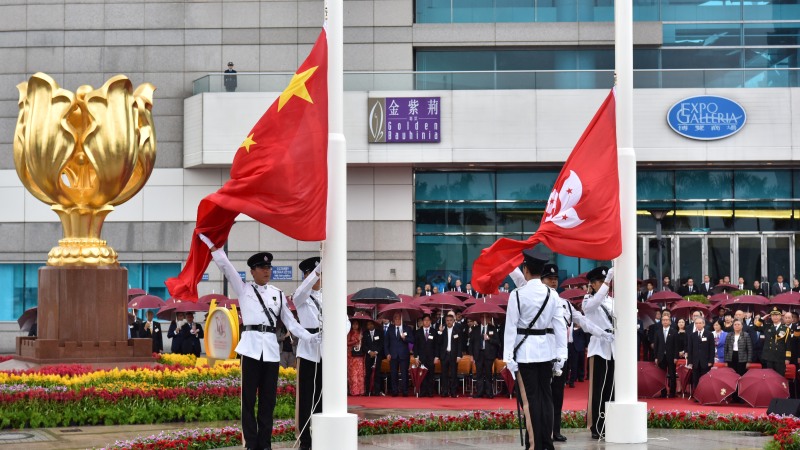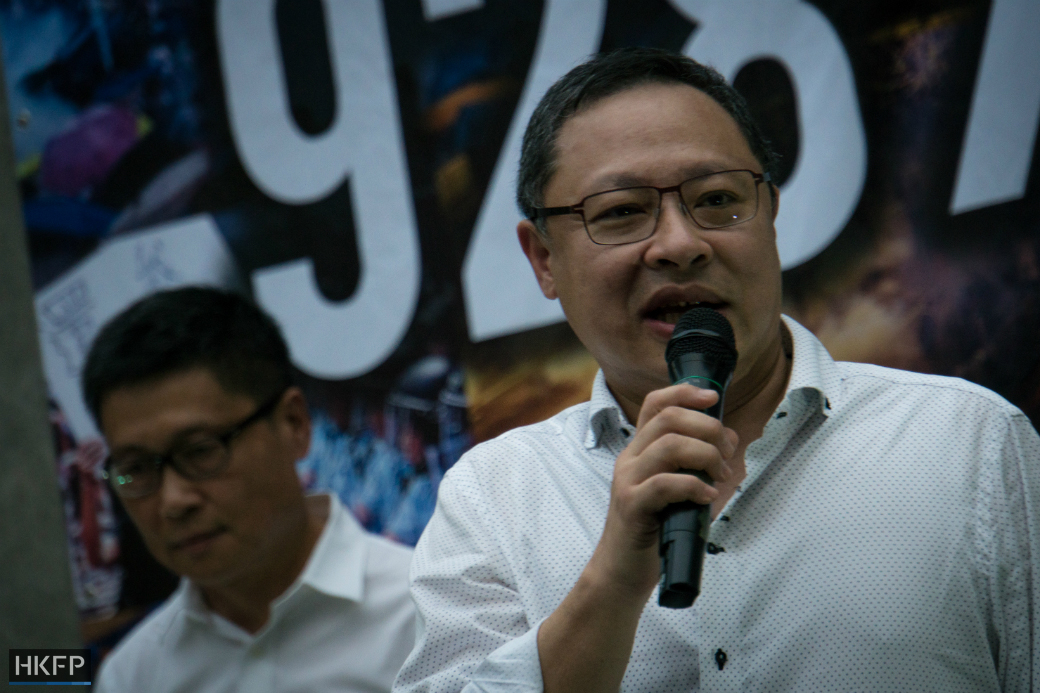The High Court’s ambiguous position on the scope of Beijing’s power to interpret the Basic Law – Hong Kong’s mini-constitution – has raised concerns about possible ramifications lawmakers and judges must now face. Critics say that, even if the government won the legal battle, it cannot “change people’s hearts and minds” easily.
On Tuesday, Mr Justice Thomas Au Hing-cheung ruled that two pro-independence lawmakers must be disqualified on the basis that they had “declined” to take their oaths as a result of their controversial conduct. He said that even without Beijing’s ruling last Monday, he would have arrived at the same conclusion.

‘Self-contradictory’
In his ruling, Mr Justice Au wrote: “Whenever I refer to the meaning of Basic Law Article 104, it is a reference to the meaning as set out in the Interpretation,” which he said is binding. But he then repeatedly said he would have made the same ruling “with or without referring to the terms of the Interpretation.”
On this basis, he declined to determine whether Beijing’s ruling is more than an interpretation and “thus amounts to effectively a legislative act” as submitted by counsel for Youngspiration’s Yau Wai-ching. The argument is irrelevant, he said.
However, the judge then said it is debatable whether China’s top legislative body, the Standing Committee of the National People’s Congress (NPCSC), has the final say over the meaning and scope of “interpretation” under Article 158, “given that the NPCSC has the ultimate power to interpret the Basic Law.”
Article 158 of the Basic law confers on the NPCSC the power to interpret any terms in Hong Kong’s mini-constitution. It does not specify whether it can also interpret the term “interpretation,” though Mr Justice Au suggests it can.
Lawyer Kevin Yam told HKFP that Mr Justice Au’s reasoning appears to be self-contradictory. He said: “If the interpretation has already been factored in his view of Article 104, what does he mean by he didn’t need the interpretation to come to the decision?”

“It’d have been best if he stayed completely silent given that he’s already said he would’ve come to the same conclusion even without the interpretation. Those sort of comments are potentially unhelpful,” Yam said.
“I don’t think he is wrongly saying that Beijing could ultimately interpret Article 158, but that’s not the whole story,” he said. “It is also the story of Hong Kong’s courts having the right to look at these things pending an NPCSC interpretation.”
Asked whether the court was trying to dodge the sensitive issue of interpretation, Yam said he suspected it might be “something like that.”
Importance of ‘One Country’
Barrister Wilson Leung of the Progressive Lawyers Group told HKFP that it is understandable that the judge mentioned the interpretation. “It would be unrealistic for him to completely ignore the interpretation and pretend it didn’t exist,” Leung said.
However, he said the timing of the interpretation, handed down before the court made a ruling, “makes it difficult to avoid the perception of the government taking a ‘heads I win, tails you lose’ approach.”
Another concern is that the ruling may open the door to litigation by the government or pro-Beijing camp to challenge other lawmakers on the ground that they did not sincerely pledge allegiance to the “One Country” principle, Leung said.

See also: Domino effect? Not all lawmakers whose oaths are being challenged may lose, lawyers say
On Tuesday, Mr Justice Au held that oath-takers must “objectively and clearly” intend to recognise the importance of “One Country” in the One Country, Two Systems policy. By insulting China and advocating Hong Kong independence, the judge said, the Youngspiration politicians failed to acknowledge the “One Country” principle.
“It raises a lot of questions in the future as to how far one can go before someone will say that you’ve failed to recognise the importance of ‘One Country.’ For example, if someone refers to Taiwan as a country… if someone loves China but wants to get rid of the Communist Party, is he going to be held to have failed to recognise ‘One Country’?” Leung said.
Disqualifying judges
Article 104 of the Basic Law, a provision on oath-taking, covers members of the judiciary. Since Beijing’s interpretation of the provision did not exclude judges and Tuesday’s ruling did not touch upon the issue, it is possible that judges can be disqualified by way of judicial review even though the Basic Law sets out rules on the removal of judges.
In addition, Mr Justice Au held that the chief executive is entitled to challenge the validity of oaths in spite of the Legislative Council Ordinance, under which only the justice secretary and electors are allowed to do so.
Therefore, Leung said, the logic is that any oath-taker could be challenged by the chief executive. “Politically this is a worrying aspect because it is certainly a threat… and a risk that one would bear in mind when they take the oath, especially when we have a chief executive who is not accountable to the wider population,” he said.

‘Intention’
Leung said that while the disqualification was based on the finding that the Youngspiration politicians “intentionally” declined to take their oath, Mr Justice Au did not explore the meaning of “intention” as the focus of the duo’s argument was on the principle of non-intervention instead of their conduct.
“He only dealt with [intention] in one paragraph, so it is not entirely clear what the exact meaning of that is,” Leung said. “But one would assume he is referring to common law principles.”
Retrospective effect
Both the interpretation and Tuesday’s ruling did not clarify whether Beijing’s ruling has a retrospective effect. “In a civil law jurisdiction [such as China], these sorts of declarations are about what the law has always been, so potentially it has a retrospective effect,” Kevin Yam said.
He added that on the face of the judgment, in which Mr Justice Au said he refers to the NPCSC interpretation in defining Article 104, Beijing’s ruling does have a retrospective effect. But the issue remains unclear since the judge said he did not need the interpretation to arrive at a decision, Yam said.
HKU law professor Benny Tai, however, is of the view that the interpretation is meant to be retrospective.
“When an action did not violate the law when it was taken, but it then became an offence after an interpretation, how can people rely on the law to ascertain whether their conduct is lawful?” Tai said.

“You can’t simply say ‘this is how China’s legislation is’ to justify the eradication of such a basic principle as the rule of law,” the professor said.
Public perception
HKU law professor Albert Chen Hung-yee said that Beijing’s interpretation was not meant to target an individual case, but rather to set a set of guidelines for future reference.
But Chen’s colleague, senior lecturer Eric Cheung Tat-ming said that the interpretation, handed down when the lawsuit was pending, “had seriously damaged the rule of law.”
Although Mr Justice Au stated that he only used common law principles in assessing the case, Cheung said the issue is whether the public accepts the judge’s assertion that he was not affected by Beijing’s ruling at all.
He said an important indicator of the rule of law is whether the public perceives the court to “make decisions fearlessly, independently and purely based on the law rather than politics.”

“Though the judge said he was not influenced by the interpretation, did it help him legitimise his decision?” Cheung said. “Would it be possible that the interpretation affected his decision? This is a matter of public perception.”
He added that he was not making an accusation against Mr Justice Au – nor is there evidence for it – but it is a question raised by many in Hong Kong.
Wilson Leung said that even if Tuesday’s ruling is legally sound, the government has yet to solve the underlying political problem that many Hong Kong youths are attracted to the idea of independence.
“This legal decision will not change people’s hearts and minds. It is part of the government’s failed strategy to use the courts to try and solve political problems,” he said.

